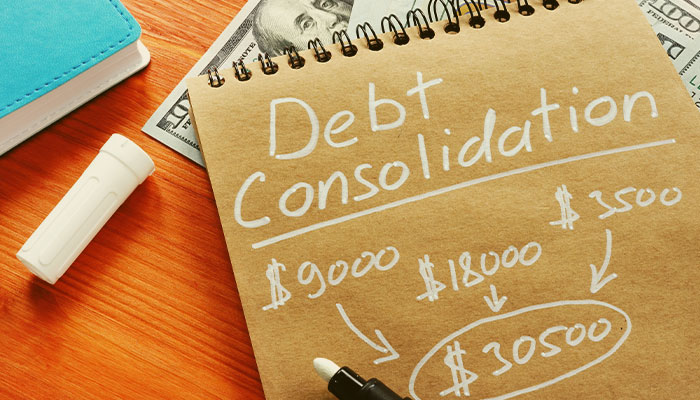
It can be so easy to fall into debt – why is paying it off so difficult? And, if you have multiple credit cards, a few loans, and a mortgage, juggling payment amounts and schedules can seem overwhelming. Luckily, debt doesn’t have to be so stressful, said Colton Cooley, Vice President and Director of Consumer Lending Sales (NMLS #1190300) with First Merchants Bank.
“The truth is, some debt is normal and even helpful,” he shared. “For instance, it can be hard to get by without borrowing money for big-ticket purchases like a car or a house. So, it's not debt that's specifically the problem—it's taking on too much debt without having an actionable plan for how to get out of it.”
There are several ways you can go about simplifying your debt, including debt consolidation.
What is debt consolidation? Debt consolidation is when you take out a larger loan to pay off other debts. While it may seem counter-intuitive, it’s a move that allows you to make a once-monthly payment to a single debtholder instead of several spread-out payments to multiple sources – and it often provides a lower interest rate.
Is it the right choice?
So, how do you know if debt consolidation is right for you? The first step, Colton said, is to step back and get a big picture look at your own debt.
“Everyone has a different threshold for their capacity to carry debt,” Colton explained, “and excessive debt is hard to define. So first you need to understand your debt.”
Debt is more than just how much you owe – it’s also who you owe, how large the payments are, how often payments are due, if a minimum payment is required, and how high the interest rate is. You’ll need to determine the answers to these questions for each of your debts to get an accurate, overarching look at your financial situation.
If the payments or interest are too high, or the number of debt holders too overwhelming, or the payments too frequent, you may be a good candidate for debt consolidation.
“Debt consolidation may be a good option for you if you can lower your interest rate overall, lower your monthly payment to allow you to pay extra on that single loan, or just to have the convenience of only making one monthly payment,” Colton explained.
Consolidating Your Debt
If you determine that debt consolidation is right for you, there are a few different paths you can take to simplifying your monthly bills.
“The first option is to get a personal loan, Home Equity Loan, or Home Equity Line of Credit,” Colton explained. “Of course, for two of those you need to have equity in your home to make it work.”
However, all three typically carry a lower interest rate than your average credit card – which can charge more than 20 percent in interest. Home Equity Loans, on the other hand, may only have an interest rate of 7 to 10 percent. And even the higher rates carried by an unsecured personal loan – often between 10 and 15 percent – can still save you a lot of money in the long run.
“When it comes to consolidating debt, you really want to consider those interest rates,” Colton said. “High interest rates on a credit card means it can be difficult to make progress in paying down debt – so if that is your situation, taking out a lower-rate loan to pay off that credit card could really ease that financial burden.”
The other common way to consolidate debt is to perform a balance transfer.
“It’s simply transferring your current credit card balance to a new credit card and paying off the debt before the new card’s introductory rate expires,” Colton explained. “Often, this can be done for 0 percent interest, which can make it a no-stress process.”
Need help figuring out which option could be right for you? Make an appointment with one of our attentive local bankers to help chart the path!
Moving forward
Of course, consolidating your debt doesn’t mean it’s fully paid off – you’ll need to keep on top of the new loan or card’s payments while being careful to avoid additional debts.
“Once you consolidate your debt, be sure to watch your future spending,” Colton said. “You don’t want to create more debt and back to multiple payments. Be sure to assess and understand your spending personality, use budget tools and create a savings plan. Doing so can help you to be more educated and empowered to maintain a healthy and manageable debt load.”
Want to get started on a new budget? Check out our blog on Budgeting Tips and Tricks to get started or use our innovative Personal Finance tool to help you stay the course.
Create a savings plan using our helpful savings calculator.

